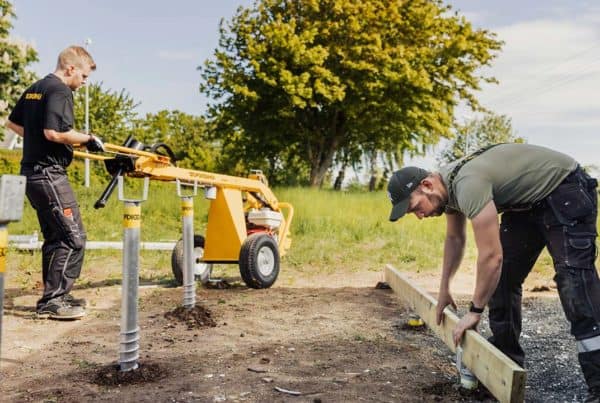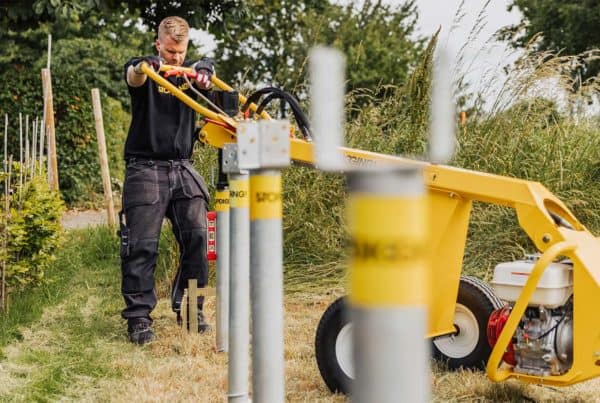STOP DIGGING GROUND SCREWS ARE THE BEST OPTION
Ground screws from Stop Digging are a flexible and simple alternative to concrete, with minimal effort required to install them. This means you avoid trampled flower beds, excavated lawns, heavy concrete bags and anything else that may add extra stress. The ground surrounding the screw is not destroyed and in addition the ground screw itself can be reused. Even the removal of our ground screws leave minimal traces. They save you a lot of physical work, and your construction is completed faster.
You can plan your construction as usual and then contact us at Stop Digging to book a time for installing the ground screws – you will then receive a price quote. The installer will pre-drill the holes before installing the ground screw so that they have the best possible attachment to the ground. The ground screw can even be set in asphalt and can be installed in the event of frost. All attachments and dimensions follow the Swedish construction standard and there are many applications for special assembly. Our installers will help you find the best solution for your construction project.
Ground screws work much like concrete supports, but are kinder to both the environment and your garden. They can be installed in all types of soil without problems and emit 60% less carbon dioxide than concrete plinths during their production and use. Screws are hot-dip galvanized according to ISO 1461, which means that they do not rust regardless of climate. Ground screws from Stop Digging are CE marked and manufactured according to ISO-certified methods. When you use our ground screws for your foundation, you save time, money and work, which makes our ground screw an easy and flexible choice. In addition, Stop Digging provide a 25-year guarantee on all our ground screws.
COMPARE FOUNDATIONS
A foundation is needed when you are going to anchor a building to the ground and there are a number of different foundations on the market. Some are dug into the ground, but you can also find varieties that are screwed into the ground. The decision of which kind of installation to go for affects what foundation you can have.
WHICH FOUNDATION SHOULD YOU CHOOSE?
The most common house foundations in Sweden are concrete slabs, creeping foundations and basement foundations. But which foundation is best? A concrete slab is good for large constructions and it is also the most common for a house foundation without load-bearing floors. It also makes the foundation moisture-proof and possible to insulate. Creeping ground is an old favorite that is often used in modular houses that are already completed. It is also an affordable option. The basement foundation is a classic foundation that also provides extra space in the house. The most important thing is to have functioning drainage. The foundation you choose depends entirely on where and what you are going to build and what needs you have.
WHAT IS THE FOUNDATION?
The first practical and important step in all construction is to create a stable foundation and therefore you should attach great importance to which foundation you choose. This applies regardless of whether you are building a sauna, a conservatory, a shed or a small house. We will explain more about different types of foundations such as concrete foundations, earth anchors, ground screws and concrete plinths to make your choice easier.
CONCRETE FOUNDATION
A concrete slab is a very involved type of soil anchorage system that is needed for larger houses. First, there must be a base bearing. Then a mould is required where steel reinforcement bars are placed before filling with concrete. It is a time-consuming and expensive alternative to standard foundations and is really only necessary when building a large building.
EARTH TIE
The earth tie is a foundation that does not require digging or casting because it is simply driven into the ground with a sledgehammer. It is a pretty tough job to drive them to the required depth and it is not possible if the ground is too hard or if it is frost. With a ground anchor, you attach beams that your building then starts from.
CONCRETE FOUNDATIONS
Concrete foundations are a common foundation that is dug into the ground. They must be dug to a frost-free depth and then poured level. Once in place, they require several days to cure before they can be built on. A major disadvantage of concrete foundations is the demanding job of digging them down and disposing of the large levels of soil that is produced during excavation. Building Control will need to check that the concrete is the correct grade, has been poured to the correct depth and that they are level, which is a must for a straight building and something that often requires extra equipment.
GROUND SCREW
With a ground screw, you can build all year round because it is a foundation that can be installed in warm or cold conditions, even in the event of frost. The advantages of using our ground screws as a foundation are many – they can withstand harsh climates and are carefully tested for compression, tensile and lateral loads. There are many different models and lengths, so they can be used for all manner of construction projects.
We at Stop Digging have designed ground screws that provide a stable and sustainable ground foundation as a basis for your construction project. You do not need to install them yourself as an approved installer will come to you and drill the required pilot holes and then install the ground screws. You can then begin your construction work, immediately after our ground screw installation is complete.
Which foundation should you choose?
All foundations have their advantages and disadvantages, and you should think through your needs before making your choice. A concrete support is a cheap alternative that is well suited to certain situations when considering smaller projects such as fence panels. The plinth foundation can suit such projects, but they take time to dig and ensure the supports are at the same level. How long it takes to dig also depends on the soil in which they are to be buried and hard soil can be problematic.
Casting a concrete slab is a very durable alternative that is a good choice if you are building a house or large building. However, it is an expensive option that requires steel reinforcement bars or cages and you will also need to create mould. If you are only going to build something small, hollow concrete blocks may be a better alternative, but even then they require considerable physical work.





